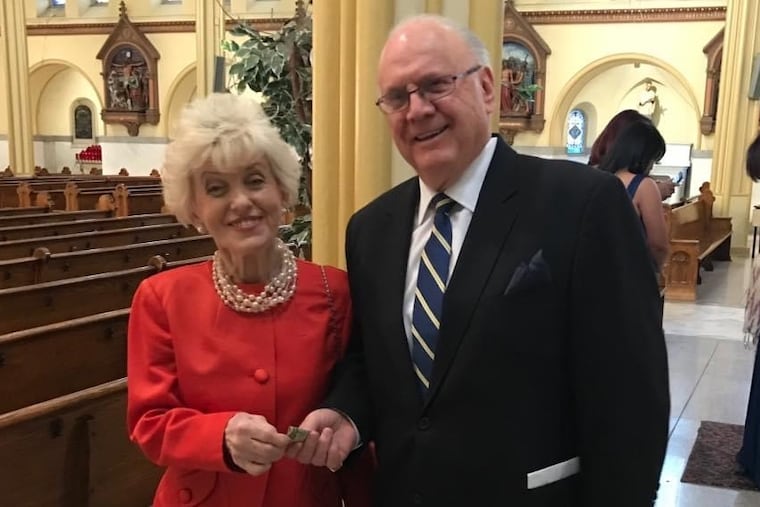Francis W. Rafferty, former City Council member and Frank Rizzo loyalist, dies at 82 from COVID-19
Mr. Raffery is remembered for his deep religiosity and a political career defined by the brand of old-school South Philadelphia politics associated with former Mayor Frank L. Rizzo.

In the mid-1970s, Francis W. Rafferty worked for Philadelphia’s Department of Licenses and Inspections by day and as president of the Grays Ferry Community Council by night.
A young father and an Army veteran, Mr. Rafferty wanted more for his life. One day, while praying at the Shrine of John Neumann, as he did almost daily, he lit a votive candle and asked God for direction.
Soon, he got a call from Mayor Frank L. Rizzo, who in Catholic South Philadelphia was tantamount to a deity himself. Rizzo was running for reelection and wanted to bolster his support in Grays Ferry. How would Mr. Rafferty like to run for an at-large City Council seat on the mayor’s ticket?
Mr. Rafferty, 82, who served as a Democratic member of Council from 1976 to 1992, died Sunday, Aug. 9, from complications from a coronavirus infection. Mr. Rafferty likely contracted the virus on a recent trip to Wildwood, his wife said.
The moment when Rizzo seemed to answer Mr. Rafferty’s prayer is emblematic of two qualities for which he was remembered: his deep religiosity and a Council career defined by the old-school South Philly politics that Rizzo embodied.
That brand is undergoing a harsh reassessment as progressives cast Rizzo’s “law-and-order” policies as a racist reaction to African Americans moving into previously Irish and Italian neighborhoods. Black Lives Matter protesters successfully pushed the city in June to remove the Rizzo statue outside the Municipal Services Building, a move Mr. Rafferty’s wife, Patricia, said left him privately dismayed.
Mr. Rafferty played a central role in several episodes that came to epitomize the political and social tensions of that era. A former boxer, he twice came to blows on the Council floor with Black politicians in incidents that made national news.
The first clash, during a 1979 Council deliberation over a development program critics said would displace minority communities, featured Mr. Rafferty and fellow Councilmember Lucien Blackwell trading punches after a shouting match. Two years later, Councilmember John F. Street and Mr. Rafferty exchanged blows during a heated session on schools.
The fights helped alienate Mr. Rafferty from gay rights activists because Mr. Rafferty yelled a homophobic slur at Blackwell. The LGBTQ community made defeating Mr. Rafferty a priority, and he lost reelection in 1991.
Years after the brawls, Street and Mr. Rafferty made amends, and one of Mr. Rafferty’s three sons who became police officers served in Street’s security detail when he was mayor.
Former U.S. Rep. Bob Brady, who chairs the Democratic City Committee, was a Council sergeant-at-arms at the time, and helped break up one of the fights.
Brady said Mr. Rafferty was “for the little guy, always for the little guy,” and “probably too honest and too straight-up to be in politics.”
Mr. Rafferty was a devout Catholic, attending Mass daily and volunteering countless hours for addiction recovery charities in Grays Ferry.
“That’s his legacy, if you ask me, the great example that he left me, his family [and] his friends of his Catholic faith,” said the Rev. Douglas McKay, a close friend who administered his last rites.
Mr. Rafferty was vice president of Our House Ministries, a recovery center McKay founded, and a member of the Secular Order of Franciscans.
The defining accomplishment of Mr. Rafferty’s career was shepherding the legislative efforts that helped bring cable television to Philadelphia, according to his wife, Patricia, who later served as the clerk of City Council.
In 2016, Mr. Rafferty became a Republican, his wife said. Like many in his generation, Mr. Rafferty believed an increasingly liberal Democratic Party had left him, not the other way around, she said.
That political realignment came to a symbolic culmination when protesters successfully pushed for the removal of the Rizzo statue and the planned removal of the Christopher Columbus statue in Marconi Plaza.
Mr. Rafferty visited the “defenders” of the Columbus statue, largely white men, some of whom carried baseball bats.
“They all cheered, ‘Yeah, look who’s here! Look who’s here!‘” Patricia Rafferty said. The crowd implored him to speak, but Mr. Rafferty declined, saying, “I’m not a part of this. I think I’m just getting tired.”
In addition to his wife, Mr. Rafferty is survived by sons Francis Jr., Peter, Thomas, and Michael; daughter Marypat; two sisters; and 10 grandchildren.
Viewings are to be held from 6:30 to 8:30 p.m. Tuesday, Aug. 19, and 9:30 to 10:30 a.m. Wednesday, Aug. 20, at St. Gabriel’s Catholic Church, 2917 Dickinson St.. A Funeral Mass is to be offered at 11 a.m. Wednesday at the church.